

California 1927
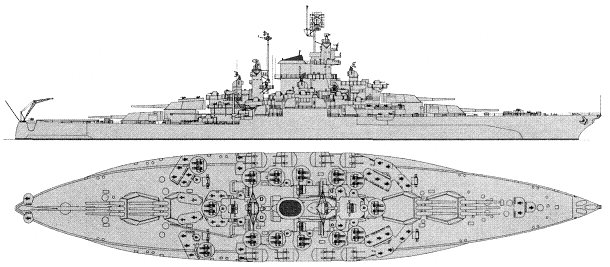
California 1945
| No | Name | Yard No | Builder | Laid down | Launched | Comm | Fate |
| BB43 | Tennessee | New York N Yd, Brooklyn | 14.5.1917 | 30.4.1919 | 3.6.1920 | stricken 3.1959 | |
| BB44 | California | Mare Island N Yd, Vallejo | 25.10.1916 | 20.11.1919 | 10.8.1921 | stricken 3.1959 |
| Data variant | as commissioned |
|
Displacement normal, t |
32300 |
|
Displacement full, t |
33190 |
|
Length, m |
182.9 wl 190.2 oa |
|
Breadth, m |
29.7 |
|
Draught, m |
9.20 |
|
No of shafts |
4 |
|
Machinery |
BB43: 4 electric motors, 2 Westinghouse turbo-generators, 8 Babcock & Wilcox boilers BB44: 4 electric motors, 2 General Electric turbo-generators, 8 Bureau Express boilers |
|
Power, h. p. |
26800 |
|
Max speed, kts |
21 |
|
Fuel, t |
oil 1900 (4656 max) |
| Endurance, nm(kts) | 20500(10) |
|
Armour, mm |
belt: 343 - 203, deck: 89, splinter deck: 38, barbettes: 320, turrets: 457 face, 254 sides, 229 rear, 127 crown, CT: 406 sides, 152 roof |
|
Armament |
4 x 3 - 356/50 Mk IV, 14 x 1 - 127/51 Mk VIII, 4 x 1 - 76/52 Mk X, 2 - 533 TT (beam) |
|
Complement |
1083 |
Project history: Two ships of 1916 programme were slightly modified New Mexicos, the principal changes being major improvements in underwater protection. A series of caisson experiments showed that a series of layers of liquid-filled and void compartments coul absorb the explosive energy of even a substantial torpedo warhead; the system in these (and other US battleships of this period) was designed to resist 182kg of TNT. These ships therefore incorporated a series of five bulkheads on either side: the outermost compartment was left void, then there were three liquid-filled ones, and then an inboard void, into which the inner liquid could burst in the event of a hit. Inboard of the torpedo protection, each boiler was in separate compartment, the boilers themselves forming a kind of inner protective layer. Two large turbo-generators were on the centerline. The dispersion of the boilers showed externally in the adoption of two funnels, rather than the previous single trunked one. The pilothouse and forward superstructure were considerably enlarged, the most prominent feature being a big air intake terminating under the pilothouse. The cage masts were of a new heavier type, and each carried a two-level enclosed top, the upper level of which was for main battery control, the lower for the secondary battery.
In addition, the elevation of the main battery guns was increased from 15 to 30 degrees. Both ships were completed in somewhat modified form, without hull-mounted secondary weapons, and with their hulls faired over the casemates of the original design.
Ship protection: 125m belt had 5.2m height and was 343mm thick at upper 3.2m part tapering to 203mm at lower edge. Belt was connected with end barbettes by 343mm bulkheads. There was 2.6m in height 203mm belt at 18.3m length aft from aft bulkhead, protecting steering gear, it was closed aft by 343mm bulkhead. Flat main armour deck was connected with upper edge of belt and was 89mm over citadel. One level lower there was flat 38mm splinter deck. This deck was 159mm thick with 159mm slopes aft from citadel, protecting steering gear and closed by 203mm bulkhead. TT were protected by 127mm deck at level of lower edge of main belt. Main gun turrets had 457mm faces, 254mm sides, 229mm rears and 127mm crowns. Barbettes were 320mm over and 102-114mm under main deck. CT had 406mm sides and 152mm roof. Funnel uptakes were protected by 229mm armour. Underwater protection was 5.3m deep.
Ship protection after modernization: 125m belt had 5.2m height and was 343mm thick at upper 3.2m part tapering to 203mm at lower edge. Belt was connected with end barbettes by 343mm bulkheads. There was 2.6m in height 203mm belt at 18.3m length aft from aft bulkhead, protecting steering gear, it was closed aft by 343mm bulkhead. Flat main armour deck was connected with upper edge of belt and was 140mm over citadel, increasing up to 165mm over magazines. One level lower here was flat 38mm splinter deck. This deck was 159mm thick with 159mm slopes aft from citadel, protecting steering gear and closed by 203mm bulkhead. TT were protected by 127mm deck at level of lower edge of main belt. Main gun turrets had 457mm faces, 254mm sides, 229mm rears and 178mm crowns. Barbettes were 320mm over and 102-114mm under main deck. CT had 127mm sides. Funnel uptakes were protected by 229mm armour. Underwater protection was 8.0m deep.
Modernizations: 1922, both: - 2 x 1 - 127/51; + 4 x 1 - 76/52 Mk X
1924, both: + 1 catapult, 1 seaplane (MO, UO, VE)
late 1920s, both: + 1 catapult (2nd), 2 seaplanes
1928 - 1929, both: - 8 x 1 - 76/50; + 8 x 1 - 127/25 Mk 10.11, 8 x 1 - 12.7/90
late 1941, both: - 2 x 1 - 127/51; + 4 x 1 - 76/50 Mk 20
3/1942, Tennessee: - 4 x 1 - 76/50; + 4 x 4 - 28/75 Mk 1, 16 x 1 - 20/70 Mk 4, SC, FC (Mk 3) radars
6/1942, Tennessee; + 2 x 4 - 28/75 Mk 1
(9/1942 - 5.1943, Puget Sound NYd) Tennessee, (6/1942 - 1.1944, Puget Sound NYd) California: were modernized as given in the table.
| Data variant | 1943-1944 modernization |
|
Displacement standard, t |
34858 |
|
Displacement full, t |
40345 |
|
Length, m |
182.9 wl 190.2 oa |
|
Breadth, m |
34.8 |
|
Draught, m |
10.1 full load |
|
No of shafts |
4 |
|
Machinery |
BB43: 4 electric motors, 2 Westinghouse turbo-generators, 8 Babcock & Wilcox boilers BB44: 4 electric motors, 2 General Electric turbo-generators, 8 Bureau Express boilers |
|
Power, h. p. |
29500 |
|
Max speed, kts |
20.5 |
|
Fuel, t |
oil 4700 |
|
Endurance, nm(kts) |
9700(18) |
|
Armour, mm |
belt: 343 - 203, deck: 165 - 140, splinter deck: 38, barbettes: 320, turrets: 457 face, 254 sides, 229 rear, 178 crown, CT: 127 |
|
Armament |
BB43: 4 x 3 - 356/50 Mk 7.11, 8 x 2 - 127/38 Mk 12, 10 x 4 - 40/56 Mk 1.2, 43 x 1 - 20/70 Mk 4, 1 catapult, 3 seaplanes (SOC, SO3C, OS2U) BB44: 4 x 3 - 356/50 Mk 7.11, 8 x 2 - 127/38 Mk 12, 14 x 4 - 40/56 Mk 1.2, 52 x 1 - 20/70 Mk 4, 1 catapult, 4 seaplanes (SOC, SO3C, OS2U) |
| Electronic equipment | SC-2, SG, 2x Mk 8, 4x Mk 4 radars |
|
Complement |
2375 |
1945, Tennessee: - Mk 8 radar; + Mk 13 radar
1945, California: - 52 x 1 - 20/70, Mk 8 radar; + 40 x 2 - 20/70 Mk 4, Mk 13 radar
1/1946, BB43 Tennessee: 4 x 3 - 356/50 Mk 7.11, 8 x 2 - 127/38 Mk 28, 10 x 4 - 40/60 Mk 2, 43 x 1 - 20/70 Mk 10, 1 catapult, 3 seaplanes, SC-2, SG, Mk 8, 4x Mk 4, Mk 13 radars
1/1946, BB44 California: 4 x 3 - 356/50 Mk 7.11, 8 x 2 - 127/38 Mk 28, 14 x 4 - 40/60 Mk 2, 40 x 2 - 20/70 Mk 24, 1 catapult, 4 seaplanes, SC-2, SG, Mk 8, 4x Mk 4, Mk 13 radars
Naval service: During raid of Japanese carrier aircraft to Pearl Harbour 7.12.1941 Tennessee was damaged by two bombs and ensuing fire, repair lasted till the March, 1942; 12.4.1945 she was badly damaged by kamikaze, and was one month under repair. California during raid of Japanese carrier aircraft to Pearl Harbour 7.12.1941 received hits of two torpedoes and several bombs and ran aground. She was salvaged 26.3.1942 and was under repair and modernization till January, 1944; 6.1.1945 she was damaged by kamikaze and was under repair till May, 1945.
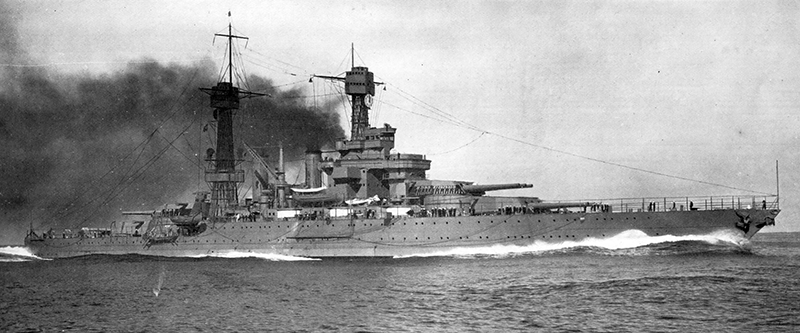
California at speed

Tennessee 1942 (Navypedia)

California 1945 (Navypedia)
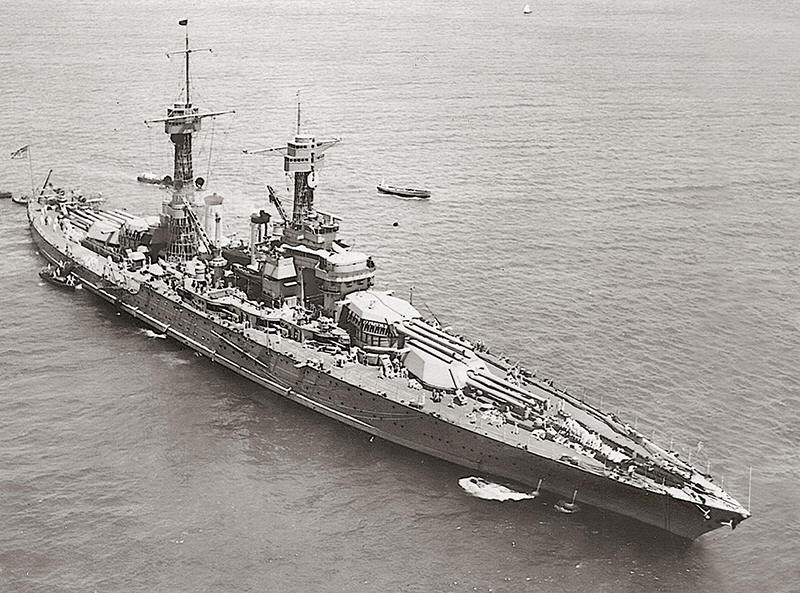
Tennessee
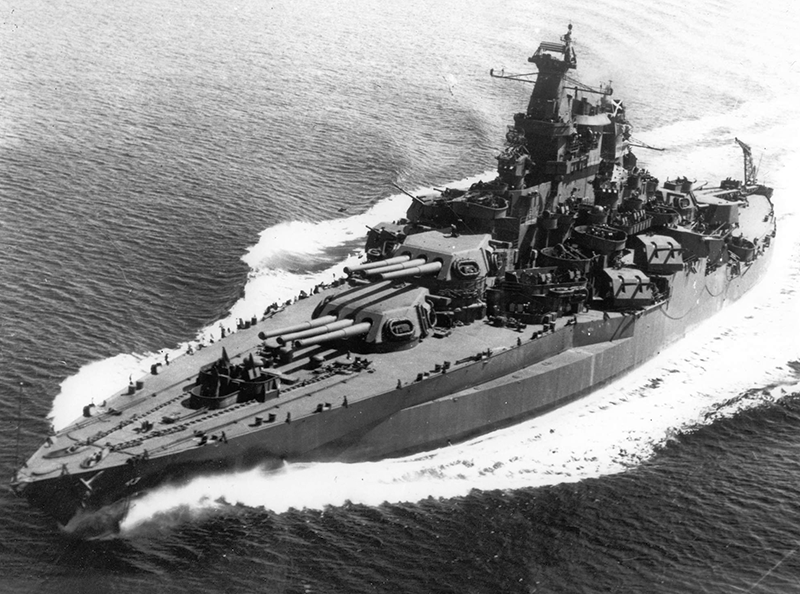
Tennessee at 20kn on trials off Port Angeles 12.5.1943
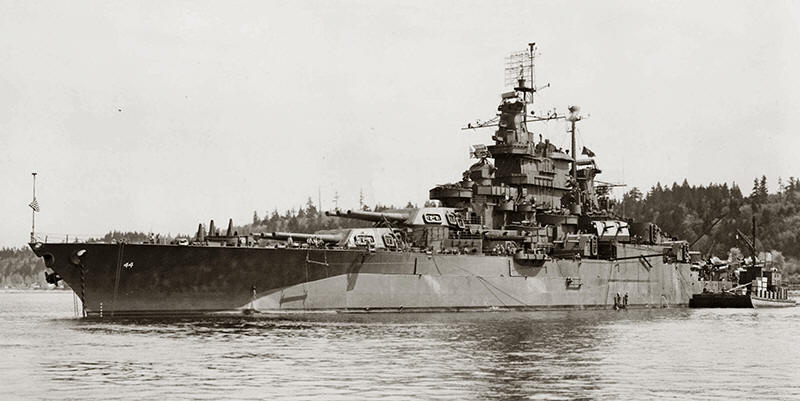
California after refit
© Navypedia, 2020